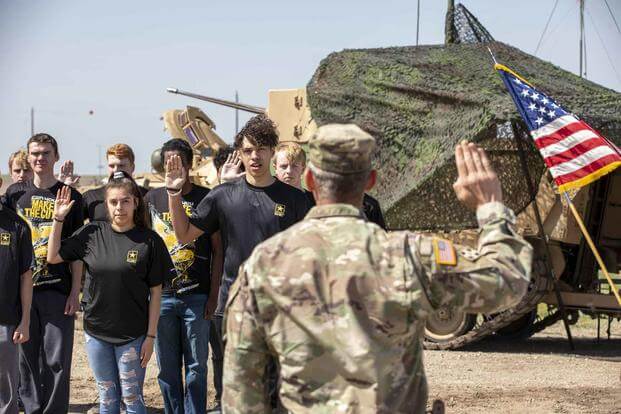Without warning, hundreds of noncommissioned officers were ordered via email to report to the recruiting school at Fort Knox, Kentucky, in less than a week, with hundreds more set to start at the school in December -- a sudden unexpected move by the Army as the service scrambles to boost its recruiting force by 800 by the end of the year.
The orders came after a breakdown in how the Army tracks how many recruiters it has coming through the pipeline along with retention of existing ones, according to Lt. Gen. Douglas Stitt, the Army's top personnel officer. The sudden depletion of recruiters caught Army planners flat-footed, with officials unable to provide a clear explanation as to what went wrong. Now, NCOs will likely have to move during the holiday season and in the middle of the school year, sowing chaos for families.
"Given the six-day heads up, we have zero time to plan child care," one noncommissioned officer told Military.com on the condition of anonymity because they were not authorized to talk to the media. "We can barely find and afford child care during the week as it is, so now my wife may end up having to quit her job entirely because it is impossible to find on the weekend."
The Army has roughly 10,000 recruiters, but that force has been bleeding troops over the past year. The 800 emergency recruiting students will allow the service to maintain its numbers. Recruiters have reported to Military.com in recent months of working longer hours and, in some cases, getting fired for missing quotas.
"I want to apologize to the soldiers and families for receiving this last-minute notification; that mistake is mine," Stitt told reporters Wednesday. "It's not lost on me, particularly at this point in time on the cusp of the holidays, the [impact] this has on our soldiers and NCOs."
The mad dash to fill its recruiter ranks has the Army dismissing minimum standards to send soldiers to the school, including getting rid of requirements that they have passing fitness scores and be in compliance with body weight standards, according to an internal email reviewed by Military.com. Some soldiers who were set to be drill sergeants will be reassigned as recruiters.
To incentivize recruiting roles, the Army is offering promotions and sometimes money. The service will promote sergeants going to recruiting school to staff sergeant -- assuming they are not flagged for reasons such as failing the fitness test -- "no questions asked," Sgt. Maj. Chris Stevens, the top enlisted leader for personnel policy, told reporters.
The opportunity will extend to soldiers recently promoted to sergeant, with time in service and grade requirements being waived, possibly serving as a fast track on the enlisted promotion ladder. The soldier is still expected to complete the Advanced Leader Course, but it's unclear if that needs to be done within a year as is required with temporary promotions.
Those who attend recruiting school and attend by February will earn a $5,000 bonus. Current recruiters who extend their recruiting contracts can earn $1,500 per month for one year. Staff sergeants who volunteer for recruiting school, and recruit 24 applicants in their first year on the job, will be promoted to sergeant first class. That incentive is not for the group of soldiers who were forced to go to the school.
The services have been struggling with recruiting since the COVID-19 pandemic. The Army has attributed many of its problems to a shallow pool of qualified applicants and a relatively healthy job market. Recruiters have fought to find applicants who are fit enough to serve, amid a nationwide obesity epidemic, while flagging performance on the academic entrance exam, blamed on underfunding at America's public schools, adds another challenge.
The Space Force and Marine Corps hit their recruiting goals last year, but those services are much smaller than the rest and, therefore, have a lower bar for recruiting quotas.
The active-duty part of the Army came up 10,000 new recruits short of its goal of 65,000 for the past fiscal year. The Army Reserve is in an even more dire situation, getting only 9,319 new soldiers. Its goal was to recruit 14,000. The Army National Guard fared much better, bringing in 29,457 new soldiers, just shy of its 30,880 goal.
-- Steve Beynon can be reached at Steve.Beynon@military.com. Follow him on X @StevenBeynon.
Related: After Missing Recruiting Goals, Army Announces New Occupational Specialty to Increase the Ranks












